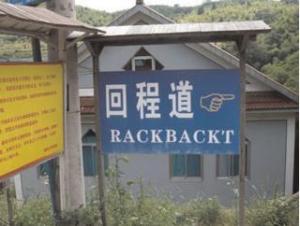Some people may think that China English and Chinglish are the same variety of English. However, there are some differences between them. As we are trying to distinguish them, we have to pay attention that there is no clear boundary between Chinglish and Chinese English so it is impossible to place them neatly into two categories because they are on a continuum.
Both China English and Chinglish are incomprehensible to native speakers of English but the reasons behind it are different. For China English, its lexicon attributes to the influence of Chinese so it reflects Chinese culture. For instance, the word red envelope, native speakers of English could easily visualise a red envelope in its literal sense but they may not understand the term within the Chinese cultural context. For Chinglish, words are often ungrammatically strung together that make them incomprehensible to English speakers from abroad. Good good study, day day up! is an example. Actually the phrase is a word -for-word translation from Chinese, hao hao xue xi, tian tian xiang shang which means “Study hard, do have a progressive spirit every day!” Native speakers of English can understand each of the word but when they are put together, they cannot comprehend them because they are ungrammatical.
Although sometimes both China English and Chinglish are grammatically correct, native speakers of English can understand the former from its literal sense but they cannot understand the latter. For China English, the word red envelope has the basic structure of English, the adjective describes the noun which corresponds to Standard English. But native speakers of English can only understand the term from its literal sense which is an envelope that is red. Native speakers of English cannot understand Chinglish from its literal sense. For instance, Use the bottom cushion for flotation corresponds to the grammar of English.But most of us would not understand the term bottom cushion, does it mean the cushion from below or the cushion at the bottom so we cannot understand the sentence from its literal sense.
China English is adapted to express characteristics of China but Chinglish is usually used to translate Chinese to English but fail to follow the rules of Standard English. China English is able to transmit cultural references that Chinese speakers would like to communicate. Expressions such as one country, two systems and special economic zone are uniquely appropriate regarding what is happening in China and it is hard to find strict equivalents in other varieties of English. For Chinglish, it is often found in translating Chinese to English.
 |
| huíchéng dào can be translated as return route. However, a Chinglish term RackBackt is used to translate huíchéng dào which makes no sense. The only part that can correlate to Chinese is back but it has the suffix t so it is incomprehensible to English speakers from abroad. |
